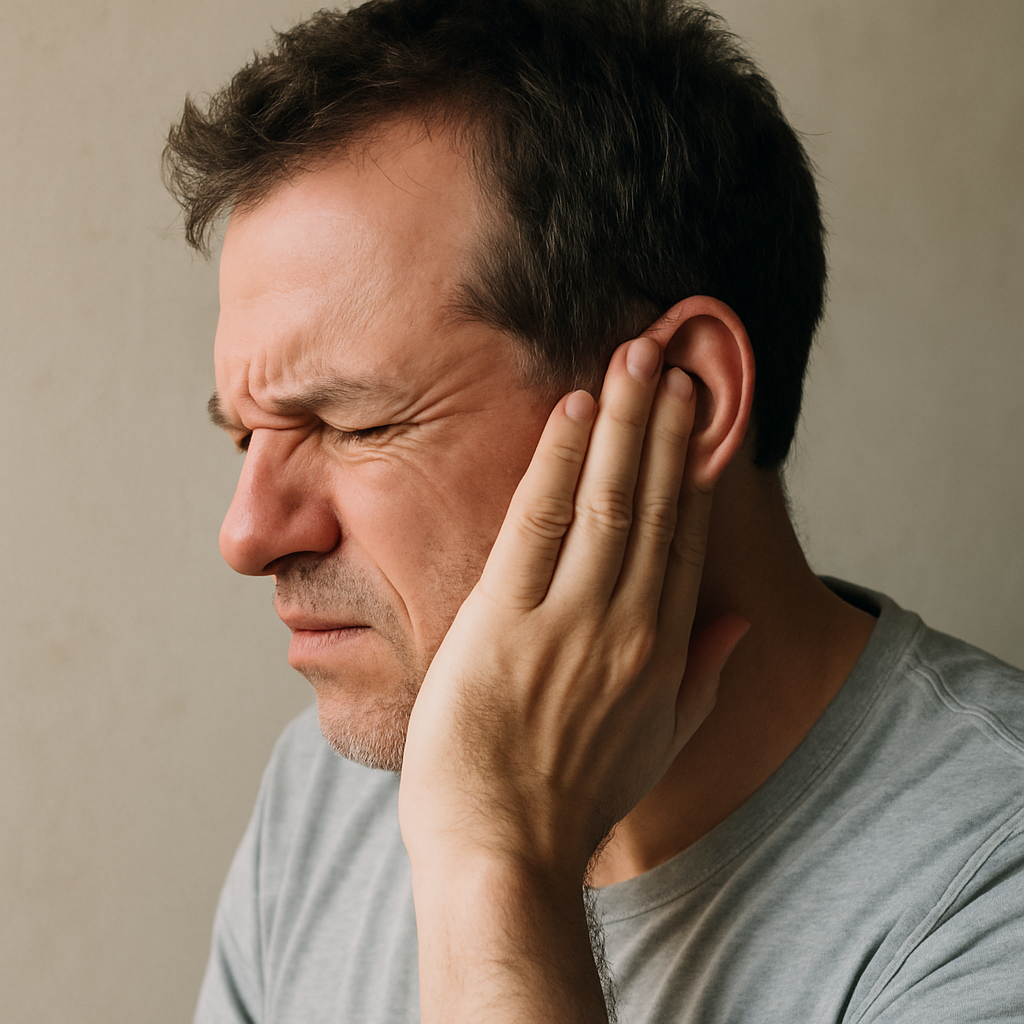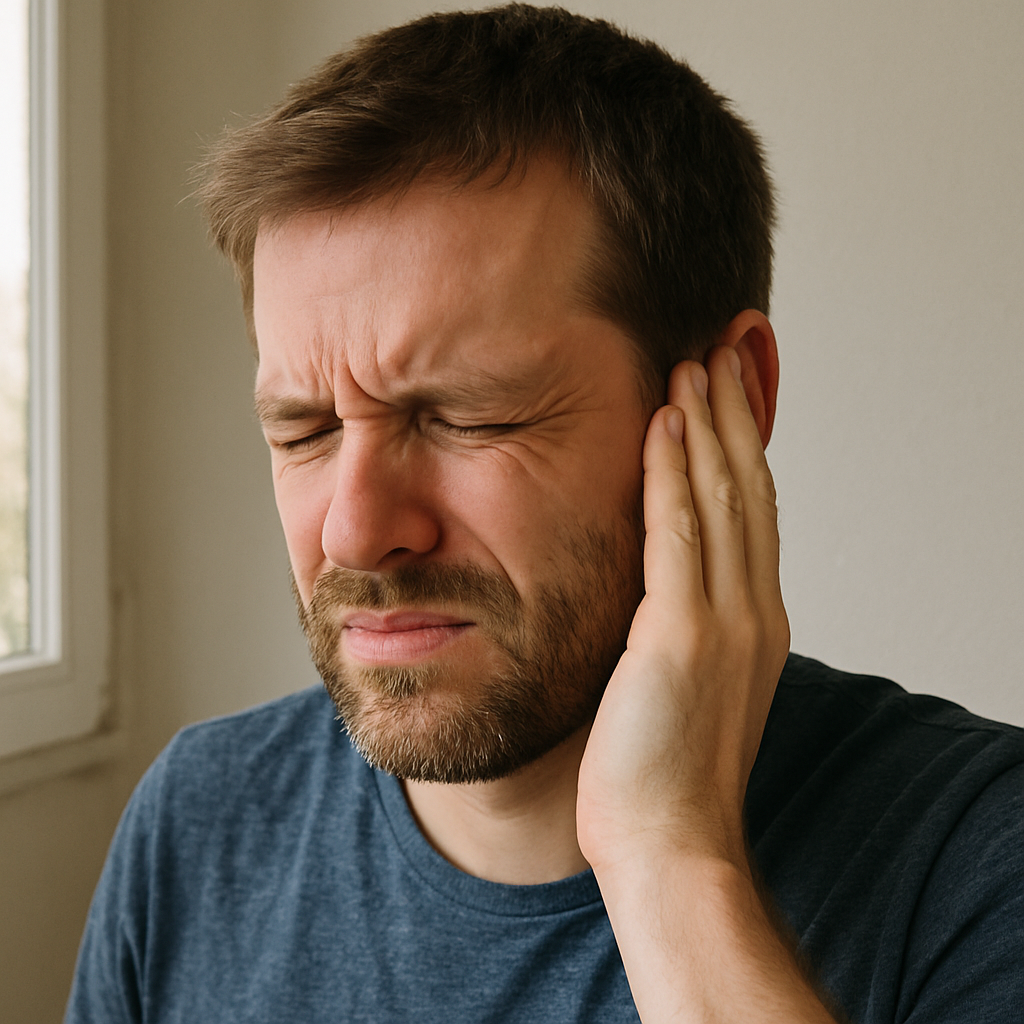What Causes Tinnitus: Common Causes and Ayurvedic Understanding

What Is Tinnitus According to Ayurvedic Medicine
Tinnitus is referred to in Ayurveda as "Karna Nada," which literally means "sound in the ear." It is typically regarded as a Vata imbalance and falls under the category of ear disorders. Space, air, and movement within the body are all governed by vata dosha. Stress, ageing, poor digestion, or excessive sensory stimulation can all aggravate Vata, which can lead to abnormalities in the nervous system and subtle body channels (srotas), which can cause phantom sounds in the ears.
Ayurveda aims to identify the underlying cause of the imbalance and address it at its source, compared with traditional medicine, which often focusses on symptom management. Treating digestive problems, calming the nervous system, or reducing the body's buildup of toxins (ama) could all be part of the solution for tinnitus.

Don't wait or self medicate. Start chat with Doctor NOW
Main Causes of Tinnitus and Their Ayurvedic Interpretation
Age, Ear Damage, and Environmental Noise
Ageing is one of the most common causes of tinnitus. When people grow older, the tiny hair cells in their cochlea (inner ear) starts deteriorating. This degeneration further affects how sound is processed, leading to that tell-tale high-pitched ringing.
Exposure to loud noise, whether it is from from industrial environments, music concerts, or constant headphone use, is another major factor. Over time, this damages the auditory nerves, causing permanent or temporary tinnitus.
Ayurvedic Viewpoint:
Ayurveda sees aging as a natural increase in Vata energy. As Vata increases with age, dryness and weakness in the tissues—particularly in the nervous system—become more pronounced. Environmental noise acts as a direct aggravator of the auditory system, further disturbing Vata and causing imbalances that manifest as ear disturbances.
Stress, Poor Sleep, and Overuse of Electronics
Modern life is filled with stressors: emotional pressure, irregular sleep patterns, excessive screen time, and digital overload. These contribute to nervous system fatigue and hypersensitivity—both of which are closely associated with tinnitus.
Ayurvedic Viewpoint:
Excessive stimulation and insomnia aggravate Vata and disturb the mind (manas), especially when lifestyle habits are rajasic—overactive, fast-paced, and chaotic. This leads to poor mental digestion, affecting both the mind and body. Ayurveda also focuses on the importance of restful sleep for healing and proper regulation of nervous system.
Drugs That Cause Tinnitus and Toxin Accumulation (Ama)
Several medications can cause tinnitus or worsen its condition. These medications can be certain antibiotics like gentamicin, diuretics, chemotherapy drugs, etc. These medicines can sometimes harm the sensory cells of the ear or disturb your brain's ability to process sound properly.
Ayurvedic Perspective:
External chemical substances like some medications can act as toxins or foreign agents that cause ama (a type of toxic buildup in the body). This ama can further block the strotas, especially those that are linked with hearing and functioning of nervous system. So, when these channels become blocked, it can cause imbalance and cause conditons like tinnitus.

How Ayurveda Explains and Addresses Root Causes of Tinnitus
Vata Aggravation and Nervous System Overload
In Ayurveda, tinnitus is most commonly linked to an imbalance or aggravation of Vata dosha, the energy responsible for movement and the nervous system. When Vata becomes excessive—due to irregular routines, overthinking, frequent travel, or cold weather—it disturbs the delicate balance in the nervous system.
This Vata disturbance manifests as erratic neural activity in the auditory pathways, which may result in a constant ringing in the ears or even pulsatile tinnitus. The more heightened the Vata imbalance, the more intense and persistent the sound becomes. Individuals may also experience anxiety, dry skin, constipation, and insomnia—other classic signs of Vata overload.
Gut-Brain Axis, Digestion, and Srotas Blockage
One often-missed cause of tinnitus is poor digestion. In Ayurveda, it's believed that when your digestion isn’t working well, it creates a sticky waste product called “ama.” This undigested residue can travel through the body and settle in weaker areas—like the ears—leading to problems such as tinnitus.
When the srotas—tiny channels in the body that carry nutrients and energy—get blocked, it can interfere with how we hear. This is especially a concern if toxins reach the Majja Dhatu (which relates to the nervous system) or the Shabda Vaha Srotas (the pathways that carry sound). When these areas are affected, it can lead to distorted or irregular hearing, like the ringing sounds of tinnitus.
Modern research increasingly supports the connection between gut health and brain function—known as the gut-brain axis. Ayurveda has been acknowledging this link for centuries, recognizing that restoring digestive fire (Agni) is essential to resolving chronic conditions like tinnitus.
Role of Mental Tension and Rajasic Imbalance
Mental stress, overstimulation, and emotional exhaustion are major contributors to tinnitus. In Ayurvedic philosophy, these conditions are driven by an excess of "Rajas"—a quality of energy associated with restlessness, ambition, and motion.
Rajas dominates when the mind is overactive, jumping from one thought to another. Over time, this creates instability and sensory overload, which exacerbates ringing in ears causes like chronic stress, insomnia, and anxiety. Many individuals notice that their tinnitus spikes during high-stress periods or emotional turmoil.
To balance Rajas, Ayurveda recommends grounding practices that promote "Sattva" (clarity, calmness, and wisdom), such as meditation, mindful eating, and limiting sensory input from devices.

How to Prevent Tinnitus: Natural Practices and Remedies
Daily Routine (Dinacharya) and Sound Exposure Reduction
Sticking to a steady daily routine—what Ayurveda calls Dinacharya—can really help calm Vata imbalances that often contribute to tinnitus. Little things like getting up early, eating at the same times every day, and going to bed before 10 PM can really help keep your body in balance. It’s also a good idea to be kind to your ears. You can also try avoiding blasting music, wearing earphones for too long, or spending too much time in loud places.
Even simple practices like oiling the ears with warm sesame oil (Karana Purana) can act as a protective measure, especially for those who work in noisy environments or use headphones frequently.
Foods, Herbs, and Oils to Calm Tinnitus
A Vata-pacifying diet can do wonders for managing the causes for tinnitus. This includes warm, cooked meals rich in healthy fats, root vegetables, and gentle spices like cumin, ginger, and turmeric. Avoid caffeine, cold drinks, and processed foods that increase dryness and nervous system irritability.
Herbs like ashwagandha, brahmi, and gotu kola have long been used to support the nervous system. They not only help sharpen focus and memory, but also ease stress, which is often a trigger for tinnitus. Another helpful practice is using nourishing treatments like Nasya (nasal oil), medicated ghee, or calming oils such as Bala Taila or Ksheerabala Taila. Gently massaging these into the scalp can help soothe the brain and support the nerves that affect hearing.
Breathwork, Nasya, and Head Massage Therapies
Breathwork, or pranayama, can be a powerful tool for calming the nervous system—especially techniques like Nadi Shodhana (alternate nostril breathing) and Bhramari, also known as bee breath. These gentle practices help settle the mind and bring balance to the inner sound landscape. When done regularly, they may ease both the intensity and how often tinnitus shows up.
Nasya therapy—applying medicated oil to the nasal passages—clears the head channels and supports sensory organ function. Combined with gentle head and neck massage using warm herbal oils, this therapy helps release deeply held stress and promote clarity of mind.
Conclusion
Tinnitus can feel overwhelming, especially when it manifests as a constant ringing in the ears with no clear cause or relief in sight. But understanding what causes tinnitus—from both a modern medical and Ayurvedic standpoint—empowers individuals to take a more holistic, proactive approach.
Unlike conventional medicine, which often looks at tinnitus as just an ear issue, Ayurveda views it as a sign of deeper imbalances in the body. It’s usually linked to an aggravated Vata dosha, weak digestion (Agni), and an overactive mind. Whether the cause is aging, side effects from medication, or emotional stress, Ayurveda offers specific approaches to both heal and prevent tinnitus by addressing the root of the problem.
By restoring equilibrium through routine, mindful living, and nourishing the body with herbs, oils, and diet, one can significantly reduce the frequency and severity of tinnitus. With a consistent approach, it’s not only possible to find relief but also to prevent the condition from worsening.
If you're ready to explore a natural, holistic approach to managing tinnitus, begin by tuning into your daily habits. Are you getting enough sleep? Are your meals warm and grounding? Do you spend quiet time with yourself, away from screens?
Just start somewhere. Take five minutes. Warm a little sesame oil and massage it into your scalp, or try a round of humming breath (Bhramari) before bed. No need to get it perfect—just see how it feels. Maybe you’ll sleep a bit better. Maybe not. Either way, it’s a step. Healing’s not a straight line, but it begins with simple moments like these.
Honestly, if you’ve been dealing with tinnitus and nothing’s really helped, talking to someone who gets the bigger picture might be worth it. An Ayurvedic practitioner won’t just look at your ears—they’ll look at you as a whole person. What you eat, how you sleep, how stressed you are, all of it. It’s not about quick fixes. It’s about slowly figuring out what your body’s trying to say. I know it can feel like a lot, but having someone guide you through it makes a real difference.
Remember: the goal isn’t just to stop the ringing—it’s to create a more peaceful, balanced, and healthful life overall.
FAQs
What shouldn't you do if you have tinnitus?
If you're experiencing tinnitus, avoid:
- Loud environments or listening to music through headphones at high volumes.
- Skipping meals or following erratic schedules, which aggravate Vata.
- Overconsumption of stimulants like caffeine or alcohol.
- Using drugs that cause tinnitus without medical supervision (like high doses of aspirin or certain antibiotics).
- Ignoring stress—since emotional tension is a key cause of tinnitus flare-ups.
Instead, focus on grounding routines, calming foods, and gentle sensory experiences.
What makes tinnitus flare up?
Tinnitus can flare up due to:
- Emotional stress or anxiety.
- Sleep deprivation or irregular sleeping patterns.
- Increased noise exposure.
- Certain medications (drugs that cause tinnitus, like NSAIDs or chemotherapy agents).
- Digestive issues and toxin buildup (ama).
Ayurvedically, these are all signs of increased Vata and/or Rajasic imbalance.
Can dehydration cause tinnitus?
Yes, dehydration can be an indirect cause of tinnitus. Adequate hydration is crucial for maintaining electrolyte balance and fluid pressure in the inner ear. When dehydrated, the body becomes more prone to nervous system irregularities and dryness—both of which are associated with Vata aggravation and ringing in ears causes.
Staying hydrated with warm water, herbal teas (like ginger or licorice), and moist, nourishing foods can help alleviate symptoms.
Got any more questions?
Ask Ayurvedic doctor a question and get a consultation online on the problem of your concern in a free or paid mode.
More than 2,000 experienced doctors work and wait for your questions on our site and help users to solve their health problems every day.

